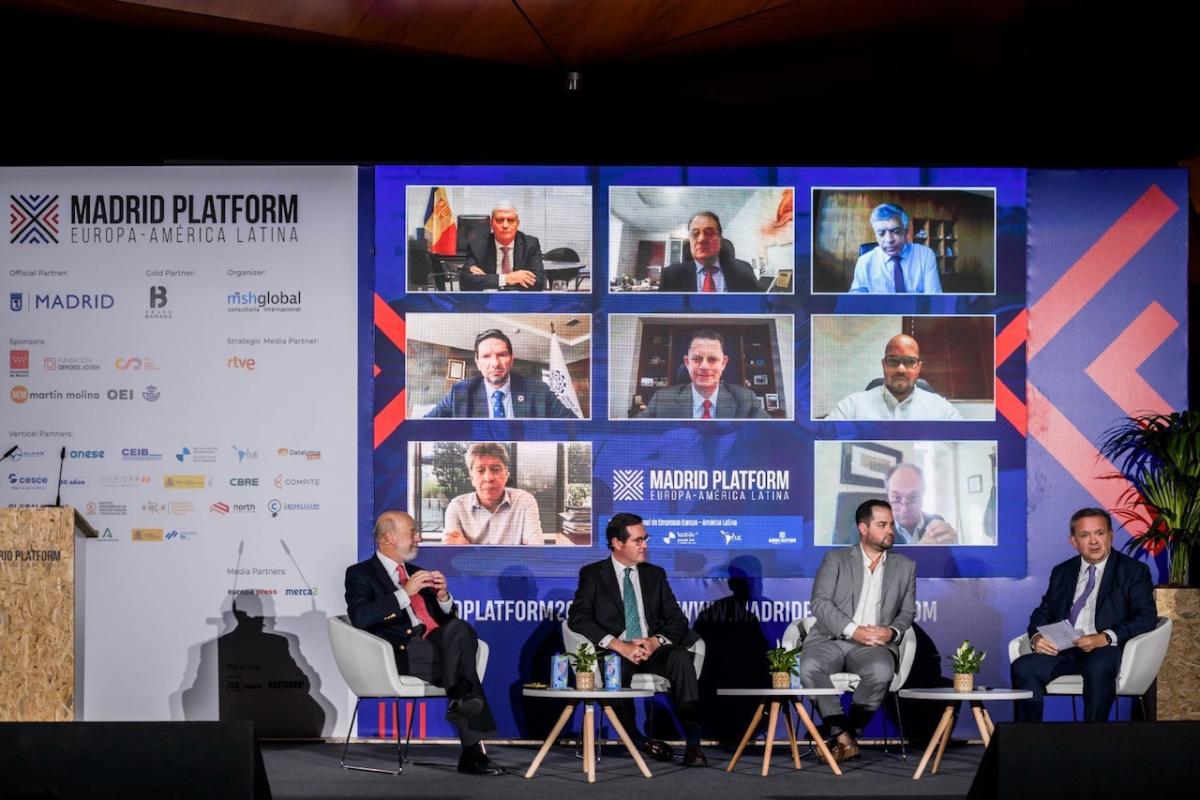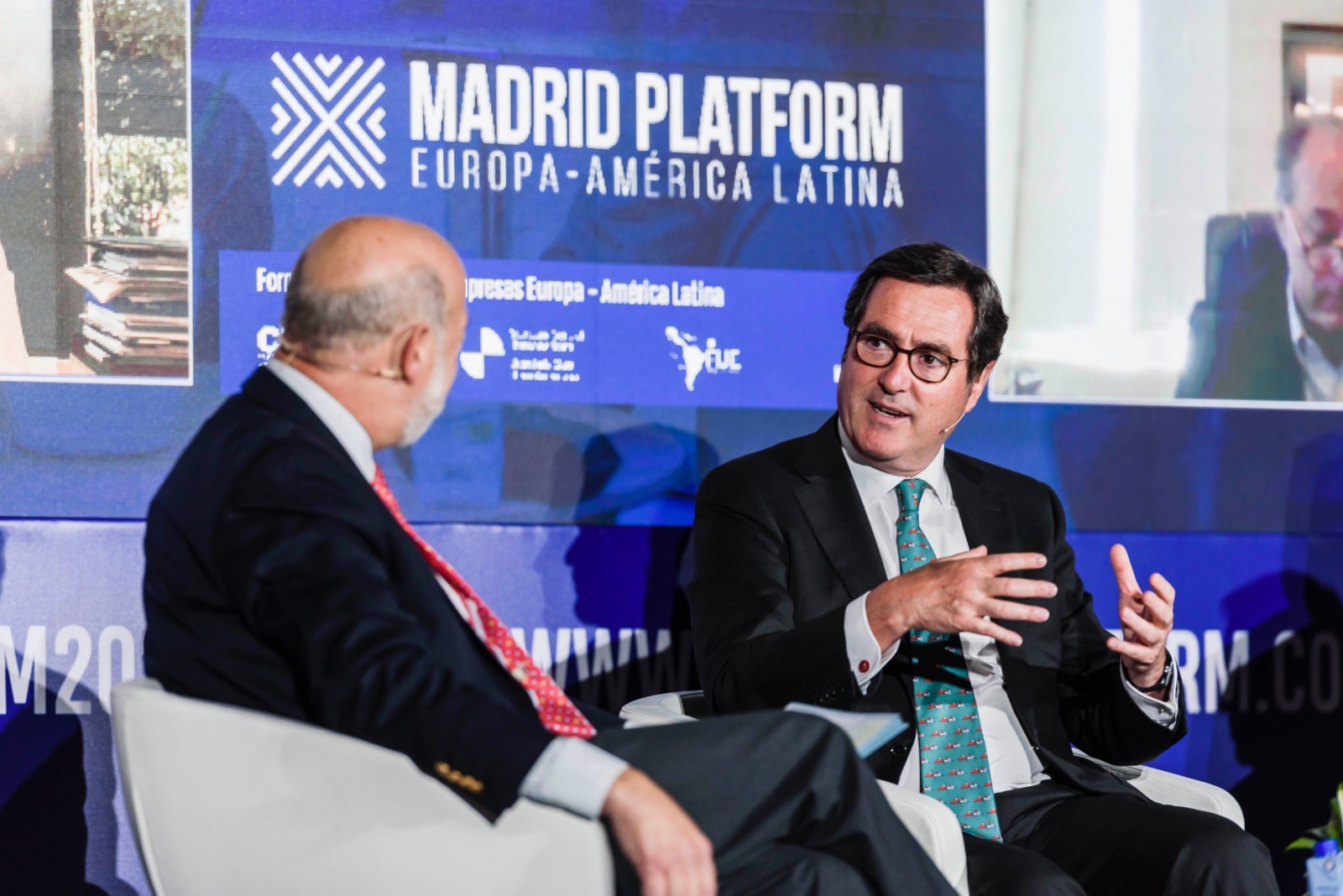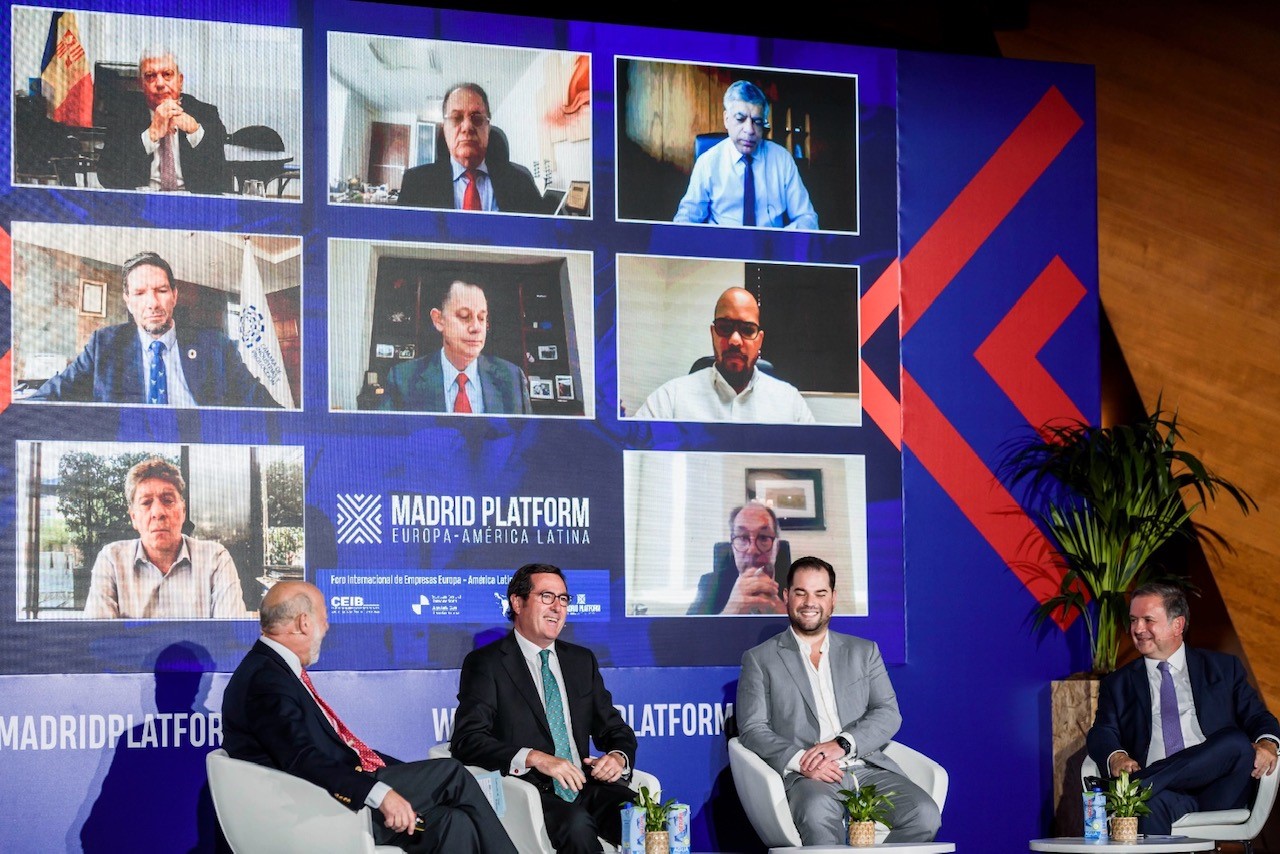The Presidents of CEIB business organisations are committed to social dialogue, legal certainty and sustainability
Issues of interest related to sustainability, digitalisation, innovation, SMEs and regional integration, among others, were discussed.

The Presidents of the business organisations of Argentina-UIA, Daniel Funes de Rioja; Andorra-CEA, Gerard Cadena; Bolivia-CEPB, Luis Barbery Paz; Chile-CPC, Juan Sutil; Colombia-CPC, Bruce Mac Master; Ecuador-CIP, Pablo Zambrano; Spain-CEOE, Antonio Garamendi; Guatemala-CACIF, Hermann Girón; and the Dominican Republic-COPARDOM and CEIB, William Matías Ramírez; the vice-president of the CIP in Portugal, Armindo Monteiro; and the president of the Ibero-American Federation of Young Entrepreneurs-FIJE, Matías Fernández, participated in a discussion during the third and final day of the Europe-Latin America International Business Meeting, which was held during the second edition of Madrid Platform. The discussion was chaired by the Permanent Secretary of CEIB, Narciso Casado
During the colloquium, they addressed, among other topics, the role of business organisations in the new situation of reconstruction and a sustainable recovery; the work of the business sector as a catalyst for change for economic growth; driving the digital transformation and industry 4.0, the reactivation of demand, the consolidation of SME policy, encouraging innovation, deepening regional integration, which are key factors for social welfare and continued growth; and public-private partnerships, as the most efficient way to progress and collaborate in devising and planning public policy, standards frameworks and regulations. The conversation was moderated by the founding partner of Pizzolante, Ítalo Pizzolante.
“E” for Enterprise and Expectation for the future of Ibero-America
The Permanent Secretary of CEIB, Narciso Casado, stressed at the round table that these meetings go back a long way, predating the Ibero-American Heads of State and Government Summits which, according to Casado, are the best tool for regional integration. CEIB was founded in 2015, under the umbrella of the IOE; and, hand in hand with SEGIB, it was decided to take a new approach to the Summits, thanks to the Business Meetings that are held beforehand. In this stage of economic recovery, Casado bet on promoting some of the permanent areas of work that we conduct at CEIB, such as: dialogue to promote regional integration; driving innovation and digitalisation; promoting infrastructure and the insertion of companies into regional value chains; implementing training plans and talent retention; and supporting the liquidity of SMEs by facilitating access to financing.
Casado also highlighted a series of concepts,” which are thought-provoking and related to business, such as Strategy, Excellence, Status, Stability, Equity, Employment, Efficiency, Effectiveness, Effectiveness, Evaluation, Education, Spirit and Structure. In his opinion, two new concepts should be added, which were much discussed over these three days: “Ibero-American companies” and “European companies”. And with all this, “we are committed to continuing to work to make More and better Ibero-America, and closer to Europe,” he concluded.
The President of the CEOE, Antonio Garamendi, highlighted the great work done by business organisations, helping companies and guiding governments to devise public policies. “At the CEOE alone, 7,000 businesspeople from different sectors are involved. Companies work to create wealth, employment, goods and services and, above all, well-being and economic growth for societies. That is why companies must be taken good care of for a country to function,” he stressed. Business organisations must have attitude and put “emotion” into what we do, as well as being united, cohesive and coordinated to go the extra mile.

We have a very important asset, he said, namely our language, and that is reflected in the Spanish-language internet of the future. “There is a lot more that unites us than separates us in the region, and we should be eager to and capable of adopting and following the model of those who do things well,” he stressed. Garamendi concluded his speech by calling for freedom, multilateralism and democracy since, without these values, neither the country nor companies would be able to operate. “It is key to promote high-quality rules, legal and regulatory certainty and all of this must accompanied by the most important infrastructure a country has, namely social dialogue,” he said.
In turn, the President of the CEA in Andorra, Gerard Cadena, recalled the last Summit held in Andorra, highlighting the two keys necessary for a more effective economic recovery: innovation and sustainability. In this respect, he believed that, after the crisis caused by the pandemic and the international armed conflict provoked by the Russian invasion of Ukraine, we have become aware of our great dependence on fossil fuels and the logistical problems we have to face. “It is essential that we demand from our governments the necessary incentives to ensure legal certainty and foster the energy transition and digitalisation,” he said.
In the case of Andorra, Cadena explained, work is already underway with the Government to pass a new digital regulation, transform the tourism sector to attract more visitors, and to seek mechanisms to cope with general rising costs. The president of the CEA also advocated implementing courageous incentives to promote renewable energies and establish subsidies for digitalising companies. If sustainability is not integrated into business strategies, there will be no viable countries or companies, he argued For all these reasons, in the future we will need “more sustainability, more social responsibility, more economic and trade relations between countries, in short: more Ibero-America.”
The role of the private sector: the key to economic recovery
Speaking at the UIA in Argentina, its president Daniel Funes de Rioja said it is very important to be clear about the role of the private sector and how it fits into state policies. In fact, he explained that in his country there is a lack of predictability and, therefore, it would be necessary to make a forward projection of which sectors and priorities have the greatest potential.
In the current context, Funes de Rioja stressed the importance of information, advocated assimilating the situation countries are facing, making a projection according to the sector and the size of the companies; and stated that he believed it is essential to support social dialogue to seek the necessary stability in governance. In this regard, the UIA reported that a White Paper has been launched, which sets out a series of proposals for sustainable and inclusive federal productive development. The challenge, according to Funes de Rioja, is to turn the recovery into growth. This document, drawn up on the basis of contributions from the institution’s member chambers, works on cross-cutting productive axes that attempt to complement the initiatives underway, so as to seek a better future.
The President of the CEPB in Bolivia, Luis Barbery Paz, said that at present “the only certainty is uncertainty” and societies need the strength of institutions and greater stability. We must strengthen interconnection networks and share experiences and points of view, he said, and we cannot look to the future without attending to the major issues of the region, such as employment, health, social protection, economic recovery and private investment. “We have to jointly structure the work agendas and choose the right institutional strategy to adopt,” he stressed.
Barbery also called for enlightening discussions towards stakeholders and for orienting them towards free enterprise. Priority must be given to the citizen as a subject of protection, he stressed, and incentives must be put in place to generate investment projects, always subject to the rule of law and legal certainty. “We must all be treated equally and have the right to equal access to opportunities,” he said. Private investment is key these days and it will not be possible to rebuild without defending this important constituency. We also need, he said, to strengthen institutions and set out collective proposals to tackle this process of economic recovery.
In the case of the CPC in Chile, its President, Juan Sutil, said that business organisations play an essential role. In fact, he pointed out, his organisation seeks to influence and to work on more and better public policies, so as to contribute to what the country really needs. But for this to be possible, companies must also fulfil their socially-responsible role; and the state must, in turn, guarantee freedom of enterprise.
The CPC seeks to ensure that companies’ impact translates into better jobs, more and better investments, the creation and development of innovation, and boosting digitalisation. There is also a need for durability and sustainability over time. “The contributions of enterprise and freedom are two factors that enable social mobility, technological innovation, social cohesion and the well-being of countries,” he said. In Chile, they are also working to develop successful public policies and to learn from other regions such as Europe, especially the Spanish model.
For his part, Bruce Mac Master, the President of ANDI in Colombia, acknowledged that 2020 was very tough, but the real recovery in the country has been very robust, with grown at levels above 8%. The business sector contributed to a great extent by adopting a series of proposals that helped to activate the productive apparatus. In his view, the great challenge lies in strengthening the role of entrepreneurship in society.
Mac Master reported that they are in the middle of an election process, which means that the business community must share with the government their most urgent needs and demands to build a strong and robust private sector. “Entrepreneurs must work with conviction and enthusiasm, because they are the basis for the nation’s social development, and the engine for job creation, digitalisation and sustainable growth,” he said. The President of ANDI concluded with the idea that “we must take care of the variables of growth beyond ideology, and make government official more convinced of the value of the private sector, as we businesspeople are.”
As for Ecuador, CIP President Pablo Zambrano stressed that the productive sector in his country is fully committed to reactivation. The first step, he stressed, was companies’ participation in the successful National Covid-19 Vaccination Plan, which enabled the recovery of productive activities.
“The challenges facing Ecuador and the rest of Latin America is to have a public policy of competitiveness to tackle external unforeseen events, such as the pandemic and the Russia-Ukraine conflict, which is affecting markets in the current context,” he said. Therefore, he explained, we need to think about how our policies work and review our ability to react to unexpected events, for which we have clearly shown ourselves to be unprepared. “Social dialogue is key to guiding countries towards an effective and lasting economic recovery,” he said.
Free enterprise, legal security and democracy
In turn, the President of CACIF in Guatemala, Hermann Girón, reported that his organisation brings together all the productive sectors in the country and contributes 85% of taxes. “Organisations are a model for generating opinion,” he said, and are key to developing proposals for free enterprise, private property, and in devising public policies that foster a positive and favourable environment for the country.
With protectionism on the rise in the region, the President of CACIF defended above all democracy, multilateralism, and freedom of expression and enterprise. Despite the obstacles, Girón bet on the great opportunities that Central America offers, given that it is a major investment destination and a model of regional integration to follow. “Looking to the future, we must encourage our young people to embrace entrepreneurship and participation in trade unions; let’s care about the narrative, let’s win the battle of ideas and not lose them to emotions, and let’s invest in Guatemala,” he said.
As for Portugal, the Vice-President of the CIP, Armindo Monteiro, said that while countries were attempting to repair the damage caused by the pandemic, war broke out with Ukraine; and this invasion, in his view, has changed and reshaped the world. “The unipolar world is giving way to a multipolar one,” he stated: Politics, he continued, should not be left to politicians alone, and business organisations should have an active voice in the process.
“We need large measures of multilateralism and international solidarity; and we need to share democracy, social justice and free enterprise,” he stressed. We must transform economies, according to Monteiro, by increasing investment and attracting talent. Ibero-America, he said, needs to set more ambitious goals, beginning with infrastructure development, digitalisation and attracting and retaining talent. The Vice-President of the CIP also called for the future to be ambitious and to combat negative or pessimistic ideologies. It is important that the up-and-coming generations always think that they can have a better quality of life than their ancestors, he said.
Areas with the greatest potential for the future: sustainability and digitalisation
For his part, William Matías Ramírez, the President of CEIB and COPARDOM in the Dominican Republic, focused on the important role played by business organisations and the private sector as a whole for Latin America’s recovery. “Organisations have never been as engaged, cohesive and structured as they are now. They played an essential role in the construction and now in the reconstruction of the region,” said Matías. Following the effect of the pandemic, the work of the business sector has been and will be decisive, he said. Areas such as sustainable development, digitalisation and innovation are more important than ever, as is their implementation through disruptive technologies.
“It is also necessary to focus on public-private partnerships, as the most efficient way to progress and cooperate in designing and implementing public policies, standards frameworks and regulations. This commitment is also bolstered by the Ibero-American Summits, which, in Matías’ words, is the most significant regional integration tool there is. “We are immersed in preparing for the Ibero-American Business Meeting that will take place in Santo Domingo, in the Dominican Republic, next year, under the slogan “Together for a fair and sustainable Ibero-America,” as part of the 28th Ibero-American Heads of State and Government Summit that will be held after it,” he said. And for the first time, he stressed, we are collaborating with all the business organisations on the island, along with CEIB and SEGIB, in preparing for this event.

Young people are not only the future: they’re the present
Finally, the President of the Ibero-American Federation of Young Entrepreneurs-FIJE, Matías Fernández, argued that young people are no longer only the future, but are also the present. Proof of this is that most of the unicorns in Latin America are led by young people aged under 40 years. In fact, in his organisation there are more than 80,000 entrepreneurs in 17 associations throughout the region. Matías said that, for some years now, especially in the wake of the pandemic, FIJE has been working “hand in hand” with CEIB and SEGIB on numerous initiatives of interest to the region related to digital transformation and the importance of the 2030 Agenda and sustainability, among other areas.
The President of FIJE, in contrast the previous speakers, focused more on the cogs and less the engine of the economy. In this respect, he stressed the importance of encouraging local partners and involving communities to reach the 80,000 members of the Organisation, making it easier to generate business. In his opinion, it is essential to enhance cooperation between organisations, since they are always stronger together. Matías also insisted on the need to recruit, attract and retain talent, since in “the current context, companies are digital and sustainable from the outset,” he stressed. Looking to the future, Matías committed to continuing to make the motto coined by CEIB and FIJE a reality, and which consists of everyone building together: “More and better Ibero-America.”
Closure
In closing the International Europe-Latin America Business Meeting, the Secretary General of FIJE and Vice-President of CEAJE, Antonio Magraner, spoke on behalf of his organisation and CEIB, highlighting the fact that we must continue to pursue the dream of making “More Latin America, making it fairer, more sustainable, more innovative and more equitable:” Above all, he advocated the promotion of public-private partnerships, but also cooperation between companies themselves, be they large, small or medium-sized.
“We have to defend freedom and democracy in our countries, and avoid populism and confrontation as far as possible,” he stressed. This is why, he stressed, the public and private sectors must work to improve the legal security companies require, since countries could not survive without the private sector, and the private sector could not operate in countries that do not function.
Finally, the head of Economy and Business at SEGIB, Pablo Adrián Hardy, highlighted the great collaboration seen over the years with CEIB and FIJE, focused above all on dialogue, cordiality and hard work. And, like all his predecessors, Adrián committed to making more of the region, but to achieve this, several challenges must be tackled, such as urgently boosting intra-regional trade, and knowing how to identify and exploit the opportunities that present themselves, which, in his opinion, are abundant. “Let’s build identity, more community, and let’s collaborate to continue to build more and better Ibero-America together.”
Related news
A large delegation made up of Spanish business organisations and companies took part this Monday and Tuesday, 9 and 10 September, in two high-level meetings with representatives of the Chinese business world, as part of the official visit of the President of the Government, Pedro Sánchez, to the People's Republic of China.
Even though China is our main trading partner in Asia, Spanish companies still have a long way to go to take advantage of the great business and investment opportunities offered by the Chinese market.
The Ibero-American Secretary General, Andrés Allamand; the President of the CEOE, Antonio Garamendi, and the President of the Ibero-American Arbitration Centre-CIAR, Javier Íscar, inaugurate a conference at the CEOE on Ibero-American arbitration. They stress the importance of continuing to support arbitration as an effective and safe instrument for resolving disputes in the region.
Business and investment opportunities in Medellin and the Metropolitan Area were assessed for the Spanish companies with interests in the area.






